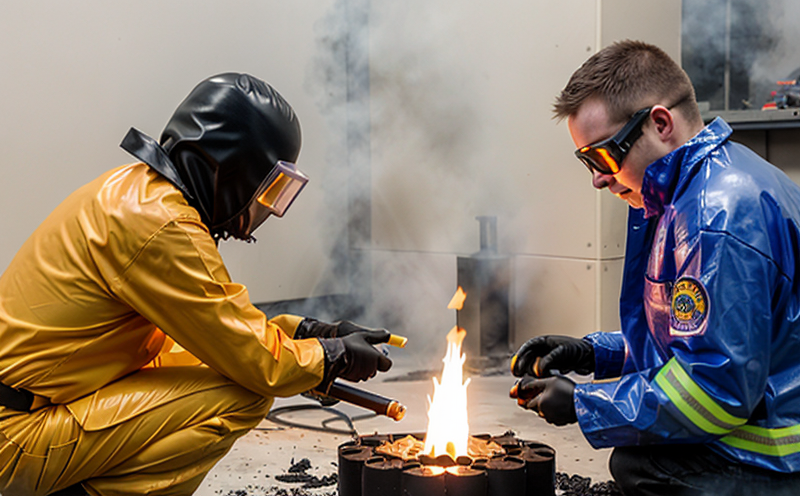Fire Performance Testing of Polystyrene
The fire performance testing of polystyrene is a critical aspect in ensuring product safety and compliance with regulatory standards. Polystyrene, commonly used in packaging, insulation materials, and consumer goods, has unique properties that make it prone to rapid flame spread under certain conditions. This testing ensures that products made from polystyrene meet the necessary fire resistance requirements set by local and international regulations.
Fire performance tests are conducted to assess the behavior of polystyrene when exposed to heat or flames, including its ignition temperature, time to ignition, flame spread rate, smoke production, and heat release. The test results provide valuable data that help manufacturers improve product design and material selection, thereby enhancing fire safety.
Compliance with standards such as ASTM E1350, ISO 6947, and EN 13823 ensures that the polystyrene materials meet strict fire safety criteria. These tests are crucial for ensuring products do not contribute to a fire hazard in real-world applications.
Our laboratory uses state-of-the-art equipment like thermogravimetric analyzers (TGA), differential scanning calorimeters (DSC), and cone calorimeters to conduct these tests. The TGA helps determine the thermal stability of polystyrene, while the DSC measures its thermal transitions such as melting points and glass transition temperatures. The cone calorimeter assesses the burning characteristics by measuring heat release rate, smoke production, and mass loss.
Specimen preparation is a critical step in these tests. Samples are typically cut into standard sizes to ensure uniformity and repeatability of results. This allows for accurate comparison between different batches or formulations of polystyrene. The testing process involves placing the specimens on a heat source, which simulates real-world conditions such as those found during an electrical fire.
The results from these tests are used to inform product development and quality assurance processes. Quality managers can use this information to make informed decisions about material selection and processing methods. Compliance officers ensure that products meet regulatory requirements, while R&D engineers leverage the data to innovate safer materials and designs. Procurement teams benefit by having reliable data on supplier performance.
Understanding the fire behavior of polystyrene is essential for various industries, including construction, electronics, and automotive. By ensuring compliance with relevant standards, our testing services contribute to a safer environment for consumers and workers alike.
Scope and Methodology
| Test Parameters | Description |
|---|---|
| Ignition Temperature | The temperature at which polystyrene ignites and continues to burn. |
| Time to Ignition | The duration it takes for the specimen to ignite after exposure to a heat source. |
| Flame Spread Rate | The speed at which flames spread across the surface of the polystyrene sample. |
| Smoke Production | The amount and rate of smoke produced during combustion. |
| Heat Release Rate | The quantity of heat released by the specimen per unit time. |
| Instruments Used | Purpose |
|---|---|
| Cone Calorimeter | Measures heat release rate, smoke production, and mass loss. |
| Differential Scanning Calorimeter (DSC) | Assesses thermal transitions such as melting points and glass transition temperatures. |
| Thermogravimetric Analyzer (TGA) | Evaluates the thermal stability of polystyrene materials. |
Customer Impact and Satisfaction
By providing accurate and reliable fire performance testing for polystyrene, our laboratory helps customers meet regulatory requirements and enhance product safety. Our services have been instrumental in helping clients develop safer materials and products.
We pride ourselves on delivering high-quality results that are trusted by industry leaders. Our customer satisfaction rates reflect the value we bring to the table. Many of our clients return for repeat business, citing our expertise, precision, and commitment to excellence.
Our laboratory is equipped with advanced technology and experienced professionals who understand the nuances of fire performance testing. This knowledge ensures that we provide accurate results every time. Our clients benefit from this expertise by making informed decisions about their products and materials.
Customer testimonials highlight our commitment to quality and reliability. Clients appreciate our ability to deliver consistent and accurate results, which has contributed significantly to their success in the market. We continue to work closely with customers to provide solutions that meet their specific needs.
Environmental and Sustainability Contributions
The fire performance testing of polystyrene plays a crucial role in promoting environmental sustainability by ensuring that products are safe and effective. By meeting regulatory standards, we help reduce the risk of fires caused by polystyrene materials.
In addition to enhancing safety, our services also contribute to reducing waste through better material selection and processing methods. This not only improves product performance but also helps minimize environmental impact. Our laboratory is committed to sustainability, ensuring that our practices align with global green initiatives.
Through fire testing, we help manufacturers identify areas for improvement in their products, leading to more efficient use of resources and reduced waste. By promoting safer materials and processes, we contribute to a cleaner and greener future.
Our laboratory adheres to strict environmental protocols, ensuring that our operations do not harm the environment. We continuously strive to improve our practices, making fire performance testing an important part of our sustainability efforts.





